The most common reason for neck pain is getting degenerative disc disease of the cervical spine. Every year this disease getting any younger. Susceptible people who daily work in a sitting position, not engaged in physical activity. It is important to know what is cervical degenerative disc disease, its symptoms and treatment at home.
Features of the disease
Osteochondrosis – a disease that affects the spine or rather the intervertebral discs. When the development of the soft elements of the disks are damaged and costeniuc, and the vertebrae begin to touch each other, thus squeezing blood vessels and nerve fibers nearby.
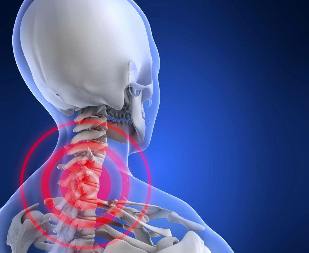
Cervical osteochondrosis – one of the most common types of lesions of the spine, which can occur as elderly people and those about 20 years.
The first signs
Due to the fact that in the cervical spinal division of the intervertebral discs is not very high, even a small damage becomes the cause of the disease. About the beginning of the problems can testify:
- osiplosti, hoarseness;
- the increase in dental problems (have to go to the dentist more often than usual, e.g. due to partial destruction of the teeth);
- blurred vision;
- the burning sensation between the shoulder blades;
- throat pain like angina;
- pain in the shoulder Department, the occipital region, across the length of the hands;
- weakness of forelimbs;
- loss of coordination, reflected in the uneven gait;
- frequent dizziness, which can be fainting;
- reduced endurance;
- the feeling of fatigue immediately after waking;
- periodically repeating headaches in the left side of the chest, radiating to the arm;
- the limited mobility of the neck, the crunch when it turns and tilts.
In various cases, cervical osteochondrosis can have a number of additional symptoms. Thus they depend on the location of the damaged intervertebral disc.
Specialists distinguish several types of syndromes, characteristic for cervical degenerative disc disease, including:
- Radicular. Develops due to pinched nerve. The person experiences sharp pain that spreads from the neck to the shoulders, then forearms and so on until the fingers (or one hand). Also radicular syndrome is characterized by tingling or "Murakami" on the skin, blanching of the skin and slight swelling.
- Vertebral artery syndrome. The main feature is the "wrap-around" headache. Most often this pain is constant, but in some cases may be recurring. Amplification of pain occurs after increased activity or after a long stay in an uncomfortable position. With a simultaneous decrease in immunity, headache may be accompanied by nausea and loss of consciousness. In this case, a possible hearing, vision and problems with the vestibular apparatus.
- Syndrome cervical migraine. In this case, due to changes in position of the vertebrae and the discs between them is disturbed circulation of the brain, which is accompanied by ringing in the ears or nasal congestion, tachycardia, noise in the head etc.
- Hypertension. Is characterized by increased intracranial pressure. The patient suffers from strong headaches, often accompanied by feeling of nausea.
Often during exacerbation of the disease the patient can rise the body temperature.
Features stages of the disease and symptoms
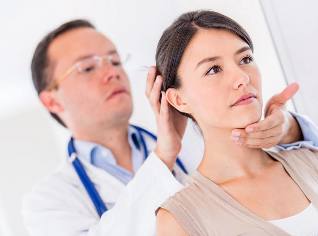
In the process of disease development experts distinguish 4 stages:
- Stage I. At this stage, the intervertebral disk displacement, violation of their stability. The person can feel the muscle tension in the affected area and a little pain. For mild symptoms, as a rule, this stage takes place almost imperceptibly.
- Stage II. Begins with the destruction of the fibrous ring, reducing the distance between the vertebrae. Symptoms – the pain is localized in certain points and increasing tilting or turning the head. Also at this point it may be fatigue.
- Stage III. Fibrous ring completely destroyed, the hernia is formed. The spine is thus deformed, the pain became much stronger. To reduce the discomfort a person is forced to restrict movement. Clear signs – frequent dizziness, fatigue.
- Stage IV. This stage is characterized by complete immobility of the damaged portion of the spine. Periodically possible extinction of pain, but then it always returned, increasing in several times.
The deeper the defeat of the intervertebral discs, the lower the probability of complete cure of the disease.
Causes of cervical degenerative disc disease
There are several reasons for the beginning and development of the disease. Among the most common:
- genetic predisposition;
- posture;
- age;
- the trauma of the spine;
- heavy loads, including heavy physical labour and sports;
- infectious diseases transferred earlier;
- wearing tight uncomfortable shoes or shoes with high heels;
- unhealthy diet, including excessive harmful foods.
In addition, the emergence of degenerative disc disease can contribute to excess weight, frequent stress, sedentary lifestyle and even severe hypothermia.
The danger of the disease
The sooner started cervical osteochondrosis, the stronger can be a possible complications. Upon the occurrence of the disease at a young age possible following consequences:
- hernia of the intervertebral disc;
- radiculopathy cervical roots;
- intervertebral protrusion in the cervical spine (protrusion);
- vertebrogenic cervicalgia, etc.
Also in the case of a running degenerative disc disease possible problems with vertebrate arteries, the development of paresis and other related diseases.
Rules for home treatment
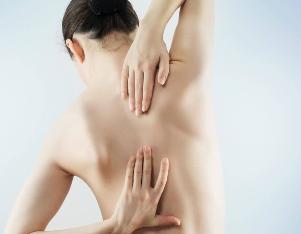
To treat cervical osteochondrosis in various ways, including to carry out the treatment at home, but under certain rules. First, home therapy give only the initial stage of the disease. In advanced disease you can also use home methods, but in combination with more professional treatments. Secondly, the methods of self-medication at home should be agreed with the attending physician after an accurate diagnosis.
Effective medications
Modern pharmaceuticals offers a wide variety of different tablets, patches and ointments or gels are directional. These tools not only help to get rid of pain in osteochondrosis, but also prevent the further destruction of the cartilage of the intervertebral discs.
Among the most effective and popular pharmacy products for the treatment of cervical degenerative disc disease are often singled out:
- Warming and anesthetic ointments/gels.
- Muscle relaxants – drugs that reduce muscle tone and reduce inflammation.
- Transdermal patches having specific medicinal treatment, which are most commonly used thiamine (vitamin B1), glucosamine sulfate, chondroitin. Under the influence of heat the drug easily penetrates into the muscles and tissue, providing anti-inflammatory and analgesic effects. In addition, the patch also relieve spasms in muscles and return them to physical activity.
- Vitamin complexes. Vitamins are an integral part of therapy, because they strengthen the body, improve metabolic processes in it, which, in turn, affects the recovery of muscle and cartilage, improving the conduction of nerve impulses, normalization of skin sensitivity, etc., Among the vitamins necessary in the treatment of cervical degenerative disc disease, experts distinguish the b vitamins, and retinol (A) tocopherol (E), calciferol (D), ascorbic and nicotinic acid
- Chondroprotectors. The main action of these drugs is aimed at restoring cartilage tissues, increasing blood circulation and reducing pain. However, treatment with these drugs gave results, they should be applied for a sufficiently long time (from 3 to 6 months).
To improve the efficiency of treatment it is possible to combine drugs from different groups, for example, vitamin complexes with chondroprotectors and patches.
The use of traditional recipes
A lot of recipes for the treatment of degenerative disc disease of the cervical spine can be found in folk medicine:
- To relieve pain during exacerbation of osteochondrosis helps an ordinary sheet of hell. For this purpose it is necessary to apply to the sore spot on the inner side and fix it with bandage. Sheet pre-scalded with boiling water. By morning the neck pain calmed down almost 100%.
- As a preventive medical aid you can use and potatoes. To prepare the potato medicine, the tuber of medium size rubbed on a fine grater and mix with honey in proportion 1:1. The consistency of the resulting composition should resemble the ointment. Potato and honey mixture is used as a compresses applied to the neck, compression on top of it is paper and towel and fix with bandage. To keep the poultice should be 2 hours, after which the skin is wiped with a damp cloth and smeared with pine oil. During exacerbation of osteochondrosis, treatment should be 7-10 days, and for the prevention of compress can be done 1 time per week.
- Another popular recipe is also involved bee product – propolis. For making homemade drugs, you will need 1 g of propolis, 50 g of aloe juice (freshly squeezed) and mustard powder. All these ingredients are dissolved in 0.5 liters of vodka or alcohol (diluted). The resulting solution was used to impregnate a fabric, which is then applied to the neck area at night. To enhance the effect of the neck additionally, you can wrap a woolen scarf.
- Paraffin compresses – another remedy to fight inflammation and pain. Before applying on the neck, the wax is melted on a steam bath and allow it to cool slightly to not burn the skin. Instead of wax you can use wax. Heating with paraffin or wax are held 1 time in 3 days.
- The dough with turpentine. For this method of treatment is necessary to make a dough from rye flour and filtered water. It should be fairly elastic but not too tight. From the received dough to form a pancake. After this sore spot rubbed with turpentine and put on top of the finished cake. Duration of procedure – 15-20 minutes, the frequency – 3 times a week.
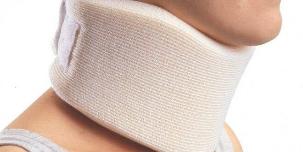
For the treatment of cervical degenerative disc disease, traditional medicine offers not only compresses and rubbing, but also the means for the reception inside:
- Herbal. To prepare a medicinal infusion'll need dandelion leaves, yarrow, thyme, St. John's wort, chamomile and calendula. Each ingredient – 1 tbsp All vegetable ingredients are thoroughly mixed. Then take 2 tbsp of mixture, put them in a thermos, pour 1 liter of boiling water and insist within hours. Ready infusion drink 3 times a day (60 ml per serving) before eating. The course of treatment – 20 days.
- Infusion of Bay leaves. To make it to 1 Cup of water will require 10 grams of Bay leaves. All the ingredients are placed in an enamel pan and boil on low heat for 5 within 5 minutes the resulting broth insist 3 hours and filtered. Drink the infusion during the day in small SIPS. The course is 4 days. After a week break, repeat the treatment.
- A decoction of parsley. It is prepared as follows: 3 tablespoons of crushed roots of the plant is poured into 750 ml of water and boiled on slow heat for hours. The resulting broth is filtered and cooled. Drink the medicine twice a day 1 tbsp. spoon. This should be made in the morning on an empty stomach and before sleep.
- Infusion of celery juice. To prepare celery root rubbed on a fine grater, after which the resulting mass is thoroughly wring out the juice. Then, for every tablespoon of juice and add 100 ml of hot boiled water and leave to infuse for 2 hours. Take the infusion of 2 tablespoons. tablespoons before each meal.
- Infusion with cranberry leaves. This infusion makes a good anti-inflammatory effect. To make it 3 tsp. of dry powdered leaves pour a glass of boiling water. After two hours the resulting composition, strain and drink 2 tablespoons three times a day.
- Alcohol tincture of pine nuts. To receive effective medicines pine nuts with the shell crushed, put in a glass container and pour vodka. Close the jar tightly and put in a dark place for a week. The daily capacity should be carefully shake. After 7 days, the resulting infusion is filtered. Drink it three times a day, 2 tsp per dose.
Also as an effective means to replenish potassium and calcium in the body traditional medicine recommends to eat several teaspoons of sesame seeds daily (at one time eat one spoon, but do it several times a day).
The effectiveness of self-massage
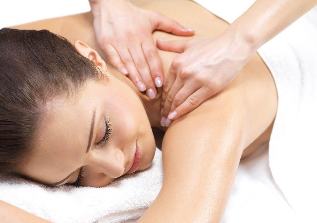
Kneading, rubbing and stroking improve blood circulation, reduce pain, relieve tension in muscles, to normalize metabolism. However, in order not to harm yourself during self-massage is necessary to observe a few rules:
- Massage should be done exclusively with the pads of the fingers.
- Do not put pressure on the injured area.
- All movements should be smooth, without sharp and rapid pressure.
- It is necessary to massage the back of the head, muscles of the back and side areas of the neck.
- To perform the procedure you need just sitting. For convenience, it is necessary to throw one leg over the other and rests the elbow to reach to the back of the neck and spine. The opposite hand it is necessary to embrace the neck from all sides.
The duration of the massage – 10 minutes. Frequency – daily. It is not necessary to do self-massage with strong pain. Better to wait until it subsides a little.
Correctly performed massage can be useful and more efficient than even the best medication.
Gymnastics
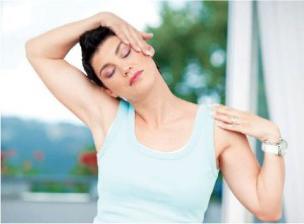
It is advisable to complement the home treatment of gymnastic exercises. They are recommended to perform after warming up in the bath or shower. The most effective exercises with cervical osteochondrosis are:
- The head tilts. To run you must stand up straight, extend hands along the body and tilt the head first forward, then backward. Each situation must be delayed approximately 10 seconds.
- Tilts to the side. Not changing the previous position, the head tilted left and right, also holding it in each direction for 10 sec.
- The situation is the same, but now you must head to alternately tilt in all directions, lingering for half a minute.
- The twists and turns. Put hands on waist, push the chin slightly forward and turn your head to the side so that it rests on the shoulder. In this position, you must stand still for 50 seconds.
- Breeding hands. This exercise is performed in the sitting position. To do this, sit on a chair, put my hands on my knees. After the hand is stretched forward and gently bred in hand. At the same time, tilt your head, then return to the starting position.
- Difficult turns. The left palm is placed on the right shoulder (the elbow at a right angle) and simultaneously turn your head to the right. Then also done the exercise using the right hand.
In addition to these exercises well help with osteochondrosis and many others. For example, during the holidays you can go on a hard sofa so that the shoulders lay on the edge and your head hanging down. Hands should be relaxed and extended along the body. Within a few minutes required to raise and lower the head, straining exclusively to the muscles of the neck. First exercise performed lying on the back, and then just turned over on his stomach.
































